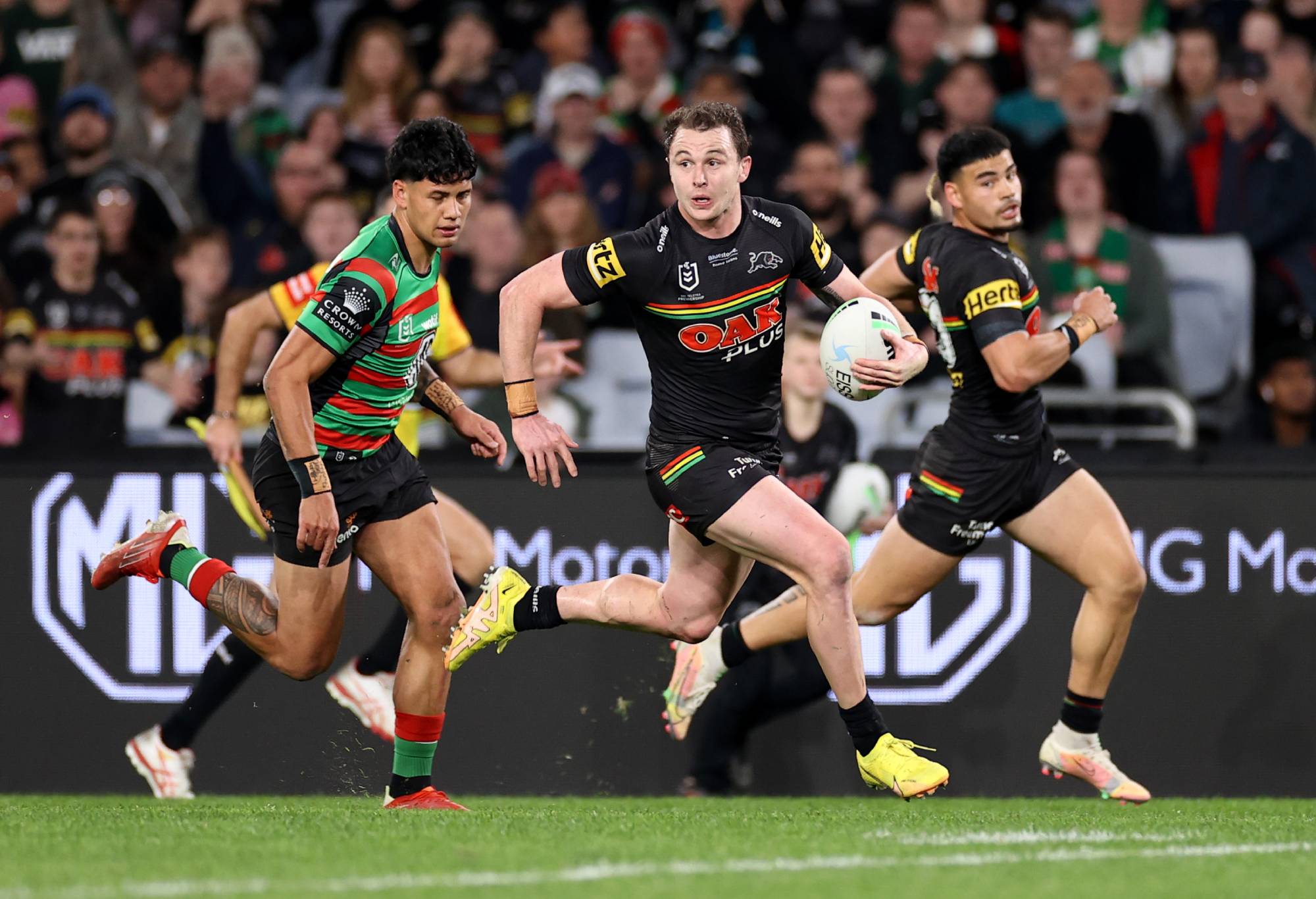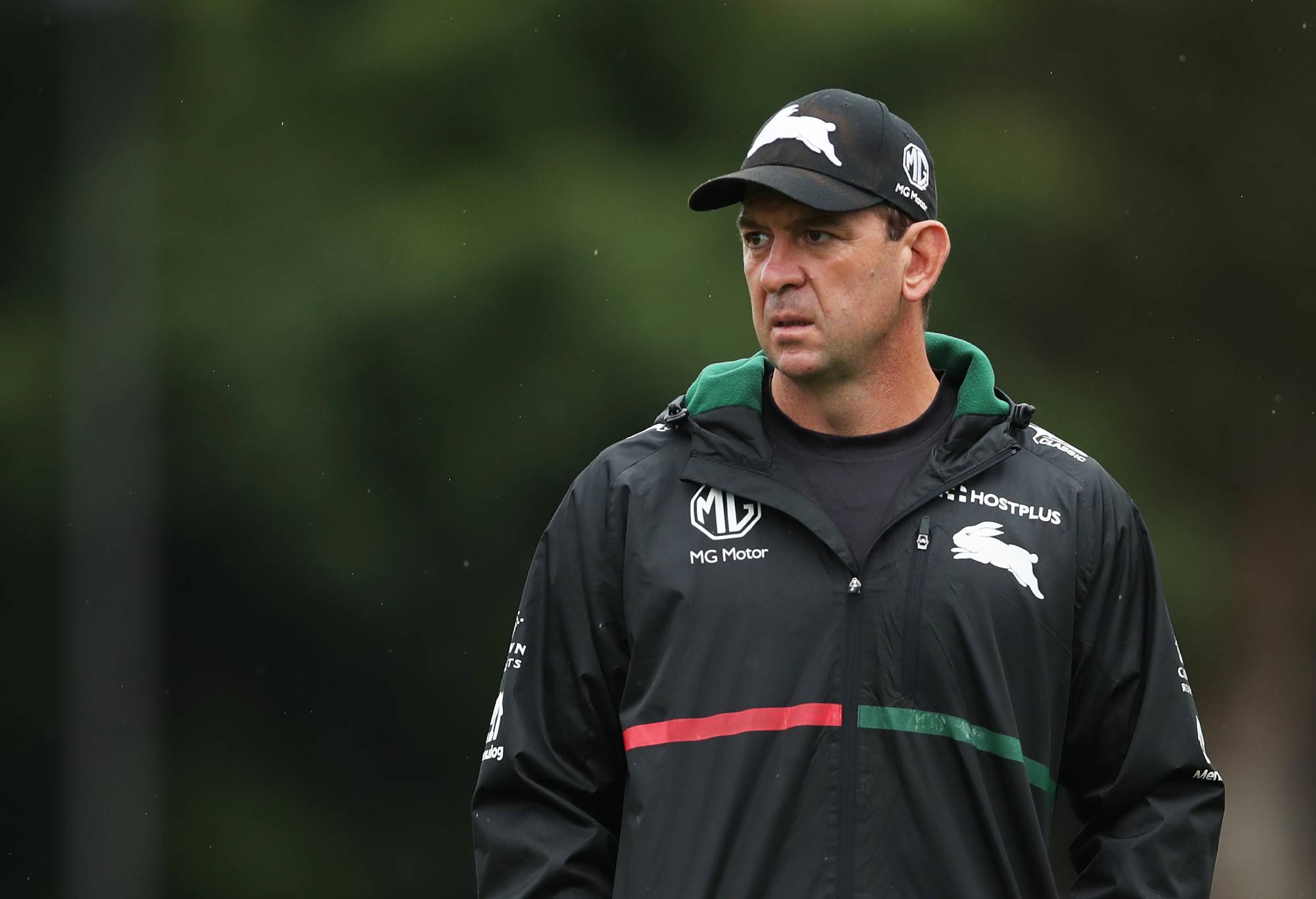
Grey areas are creeping back into the interpretation of what does and does not constitute an obstruction which, after a relatively settled period of black and white rulings, will cause a few grey hairs among the NRL coaching brigade.
Rabbitohs coach Jason Demetriou was perplexed after a crucial call went against his team in the 26-22 loss to Penrith, a result which could ultimately prove the difference between whether his team makes the playoffs or not.
Good sport that he is, the rookie mentor was at pains to say the bunker’s decision to award Panthers fullback Dylan Edwards a try in the first half was not the reason his side lost but he was still confused by the ruling.
“Honestly, I’ve given up trying to figure out what that rule is,” he said in the post-match media conference. “[Izack Tago] stops in the line. There’s no way Lachie [Ilias] can get off that.”
What he was referring to was Tago running a decoy, with the Penrith centre stopping in the red and green defensive line between Campbell Graham and Ilias, making contact with the halfback’s outside shoulder, which has been called back for obstruction in pretty much every case the past few years.

Dylan Edwards makes a break to score. (Photo by Cameron Spencer/Getty Images)
There was a similar incident the previous week when Knights centre Bradman Best was awarded a try in Newcastle’s loss to Brisbane but Adam Reynolds cried foul, claiming he was impeded.
Before we get too deep in the weeds, both tries should have been awarded. On neither occasion was the defender going to stop the four-pointer.
Graham’s poor read in defence was the reason Edwards scooted around the edge to cross the stripe and that’s why Demetrio didn’t blow up deluxe.
Too often we’ve seen legitimate tries disallowed.
A decoy runner will make slight contact with a defender a long way from where the attacking team crosses the stripe but because there was a tiny chance of that impeded player sprinting across and making a Scott Sattler cover tackle, the bunker computer says no.

Jason Demetriou. (Photo by Matt King/Getty Images)
The NRL rules state the refs or the bunker are able to “determine the significance of contact” when a decoy runner impedes a defender’s involvement.
As in, they can use their discretion, or commonsense, to decide whether a defender has legitimately been impeded and would have made the subsequent tackle or they were 100-1 to stop the try.
It’s been in the rules so it should have been applied, not a late-season adjustment on the run.
The problem now is that there can be different interpretations depending on who is the bunker official on duty night to night and when that’s the case, rat-cunning coaches and captains will be putting the pressure on for discretionary calls to allow tries that up until recently had been open-and-shut cases when the letter of the law was applied.
The NRL has swung like a pendulum do from one extreme to the other over the years when it comes to this most contentious aspect of the modern game.
Block plays only came into the game less than three decades ago but they’ve created confusion ever since.
In recent years, the NRL’s policy of having clear guidelines over the inside/outside shoulder, who initiates contact and stopping in the defensive line was far from perfect but it was consistent.
The elusive and eternal search for consistency from match officials that you hear coaches bleat about is a myth, usually designed to divert pressure onto the whistleblowers when the actions of players over 80 minutes decide the vast majority of matches.
Yes, Tigers fans, there are exceptions to that rule – the Cowboys got away with one that day, but the NRL was never going to give you the two points back.
Coaches hate “black and white” application of the rules because there’s no wriggle room for them to push the boundaries.
When it comes to the problem of coaches whinging about the obstruction rule, to paraphrase Michael Jackson, “it doesn’t matter if the rules are black and white”.
NRL head of football Graham Annesley in his weekly media briefings has mastered the five Ds of dodgeball when it comes to giving his views on refereeing decisions – Dodge, Duck, Dip, Dive and … Dodge.
The former referee and politician has shown he has the referees’ back when they have backed their judgment on 50-50 calls while also criticising them, and dropping them when necessary, when they get it wrong.
He will be forced to go into bat for his officials a lot more as we hit the business end of the finals with coaches being given another chance to vent their spleen on this topic.
The NRL has been hammered for rule changes seemingly at the drop of a hat in recent seasons. This is just a tweak in interpretations but the off-season would have been a much better time to make this decision rather than again making changes on the run.

Leave a Reply